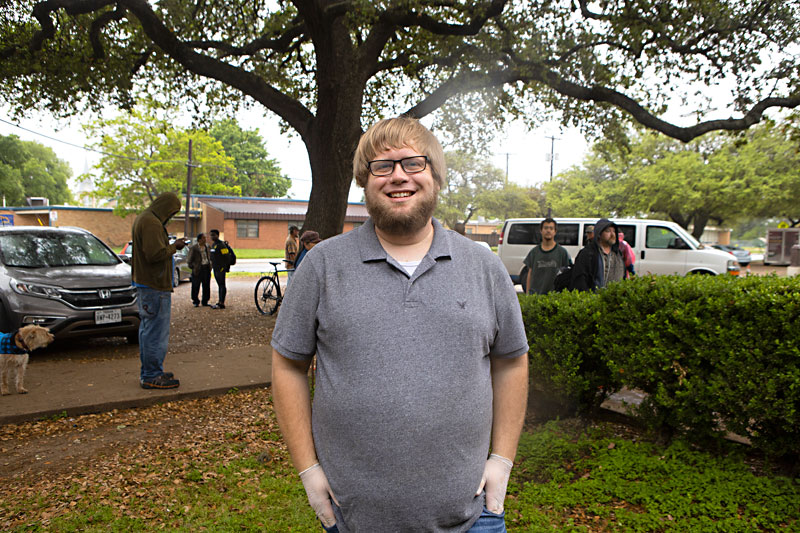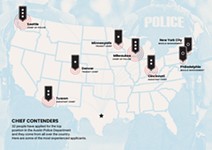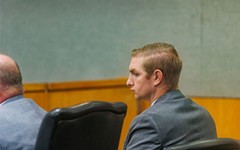Working Overtime to Provide for Unhoused Neighbors During the Coronavirus Pandemic
All shall be fed
By Austin Sanders, Fri., April 3, 2020
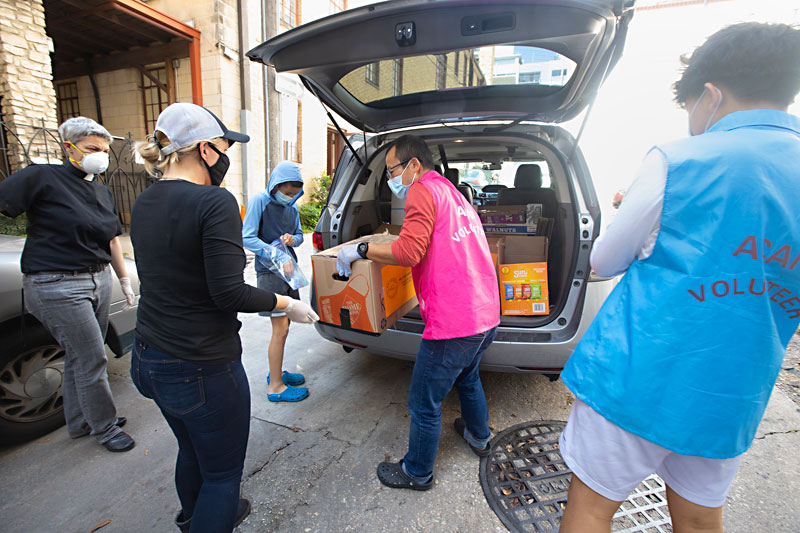
Downtown Austin is home, most of the time, to about 500 people living without shelter. Thousands more live alone or in encampments throughout the city – under overpasses, in the woods, in cars, in alleys, wherever they can. On what used to be normal days, finding food was already a challenge for many experiencing homelessness. With the spread of COVID-19 in Austin, that challenge has become much, much more pressing.
“If I said I am not worried about xenophobia, I would be lying. But we are proud Americans. This is our home, and we will help in any way we can.” –CJ ZHAO, Austin Chinese-American Network
The pandemic caused by the novel coronavirus has led shelters, soup kitchens, and food pantries to scale back their services. With restaurants also reducing service and bars outright closing, the unhoused have lost more options, especially Downtown; restaurants and bars will sometimes offer their leftover food or cash in exchange for labor to perform odd jobs. In a sheltered-in-place city, there's little vehicle and foot traffic that supports panhandling.
Austin-Travis County EMS medics, Austin police officers, and other members of the Homeless Outreach Street Team are working to fill this void – essentially a volunteer effort on top of their already strenuous workloads. They've taken on distribution duties, collecting donated meals and supplies they deliver to people they work with on a regular basis. The daily, pre-pandemic work of HOST team members depends on building trust with clients working to exit homelessness, so they are especially well-suited to performing this vital community service.
A Tension In the Air
The medics, officers, social workers, and others who comprise outreach teams do more than provide essential health care and navigate the complex web of agencies and programs that help people exit homelessness. They also offer a window into what is happening in that world.
"As a front line, we alert our community to changes that are happening with service providers and in the city," EMS Association President Selena Xie explained. "We've also become a kind of nexus point for community members wanting to help. We are happy to do that, because when we're out doing our rounds, there's a different tension in the air. People ... know they might be able to get a hot meal at a place, and suddenly it's not available – that's very distressing."
In a pre-pandemic world, that aspect of homelessness was one of the easiest needs to meet. Food was readily available from a number of sources, and volunteers were always ready to help prepare and distribute it. But as isolation measures force more and more people inside and away from that work, that reality is changing.
On Friday, March 20, Xie sent us a list of about a dozen homelessness service providers, faith organizations, and food pantries that were providing food and supplies on different days of the week and at different times. By Tuesday, March 24, about half had changed their offerings or schedule in some way. Tracking what resources are available when and where is a full-time job for service providers (and for the Chronicle), who have reliable phone and internet access. How are those living without secure housing, let alone those living on Austin's streets, expected to keep up with a patchwork system that can change by the day?
The pre-pandemic work of HOST, the shelters, and other outreach workers amplified the work of those whose mission has always included feeding the hungry and the homeless: old hands like Mobile Loaves and Fishes, Austin-Travis County's Community Health Paramedics, and Sunrise Community Church. They are still doing the work, fighting tooth and nail to continue doing it despite social distancing restrictions, and will still be doing it once society moves on from the paralyzing grip of COVID-19.
New groups and resourceful individuals have also taken on that mission; they see a disaster unfolding in their community and want to help as much as they can. Among this group are six activists who have banded together as the "Quaranteam" – ambitious, civically active women (many of whom have sought or are seeking elected office) who are trying to direct their energy at this specific relief effort. Like the old hands, they want to make sure that people are fed and can weather the stresses of a society contracting, with the social safety net – meager as it may be – contracting with it.
The Old Hands
Mobile Loaves and Fishes (MLF) has long provided much of the food eaten by people living on the streets. With its partner organizations, MLF has operated 12 food trucks that have circulated throughout the city. They are volunteer-driven, as are the commissaries that prepare the food, and like all Austin nonprofits MLF has found itself short of volunteer labor as the city has shut down to stop the spread of the coronavirus.
But MLF is still sending out trucks, and estimates they are providing about 80% of the meals served before COVID-19. The nonprofit is working on ways to get back to 100% by this week, with social distancing measures in place to protect both volunteers and patrons. They intend to keep serving food for as long as they can.
The same goes for Sunrise Community Church in South Austin, which operates the Sunrise Navigation Center. Mark Hilbelink, lead pastor at the church, told the Chronicle, "We're basically doing what we've always done, just outside, and with social distancing measures in place." That means people can show up to the church weekdays between 9am and 1pm to find food and navigation services.
Hilbelink used church funds to buy an iPad that people can use to access telehealth services and conduct video meetings with caseworkers, so their already lengthy road toward housing doesn't stretch out even longer. Some social workers have been ordered to work from home by their employers; without the kind of access Sunrise is offering, casework would likely be gummed up and halted indefinitely. (Social services are considered "essential" under the "stay home, work safe" orders currently in effect in Austin.)
The Other Ones Foundation (TOOF) is still offering services, but only to 10 people at a time, to ensure social distancing measures are followed. It has introduced a new mobile hygiene clinic, a truck designed and built specifically to respond to the loss during the COVID-19 crisis of basic-needs services on which many people experiencing homelessness have relied. TOOF staff drive the truck around the city to encampments, allowing people to shower, use the bathroom, wash their hands, and receive first-aid and harm-reduction supplies. TOOF is also distributing grocery bags of food intended to last a person for a week, filled with single-serving foods that have a longer shelf life (tortillas, peanut butter, protein bars, beef jerky, etc.).
The “Quaranteam”
Pooja Sethi had a simple idea: She and her neighbors would buy lunch for first responders and others on the front lines who continue to work – and risk exposure to the coronavirus – to serve their community. So she called Xie, whom she met last year at the Austin New Leaders Council.
"She sounded really stressed," recalls Sethi, who is an immigration attorney and candidate for Austin's District 10 City Council seat. "She told me that medics working with people experiencing homelessness were really worried about food, and that they were delivering what they could on their own time. I said, 'Give me a few hours, and we'll take that off your plate.'"
Sethi began organizing, and before long, the Quaranteam was born. The group consists of five women – Sethi, Kennon Wooten, Margaret Chen Kercher, Julie Ann Nitsch, CJ Zhao, and Ashley Cheng – who are all civically active in some way. Now, they take turns spending one day a week sourcing around 100 meals to be delivered through EMS to people experiencing homelessness.
One day, Sethi bought a shopping cart full of Lunchables. Wooten and Kercher have made dozens of sandwiches. Cheng, whose father, Ronald, owns Austin's venerable Chinatown restaurants, helped coordinate the cooking and delivery of 80 hot meals in one weekend.
The six women in the Quaranteam have also encouraged others in their friend groups to help out where they can. That outreach has led to more helping hands and fundraising from individuals, businesses, and community groups. One group in particular – the Austin Chinese-American Network (ACAN) – has leveraged its standing within that community to activate dozens of families to help in the donation of food and supplies.
Collective Action
As a founding member and current board member of ACAN, Zhao has played a key role – but she is quick to note that support has come from throughout the broader Chinese American community. That support was made manifest in the form of 320 meals, delivered on Tuesday, March 24, to the Central Presbyterian Church on Eighth and Brazos. More than a dozen families prepared individually packaged meals (180 plates of fried rice, 30 tacos, 50 croissant sandwiches, 50 plates of lo mein, 10 spaghetti and meatball plates, and 50 brownies and cookies) that were delivered by church staff and volunteers to the 250 people staying at "Camp Abbott," the state-owned land near Austin's airport designated by the governor earlier this year as a safe place for those without shelter to camp.
As Zhao told us, this effort is both a way for ACAN to realize its mission of educating all of Austin about Chinese American culture and a natural expression of Chinese values. "Community service and collective action is a big part of our lives," Zhao said. "Food is a huge part of Chinese culture, and we're having an opportunity to share that part of our lives with people. It's a way to give back and to show our community who we are."
It's not lost on Zhao that Chinese Americans around the country face heightened xenophobia as fear of the virus spreads and as Republican leaders whip up racial resentment among their followers. "If I said I am not worried about xenophobia, I would be lying," Zhao told us. "But we are proud Americans. We love the country and that's why we came here. This is our home, and we will help in any way we can." In addition to donating food, the city's Chinese American community has donated over 4,000 pieces of personal protective gear to hospitals and clinics around the city, including some 600 masks to EMS.
A Model For Restaurants?
Community service as an expression of civic pride resonates with Ronald Cheng, as he has stepped up to help feed people amid the pandemic. His daughter Ashley first suggested donating 50 meals to an organization serving those experiencing homelessness, to mark the 50th anniversary of the Cheng family owning restaurants in Austin (the first of which opened on Burnet Road in 1970).
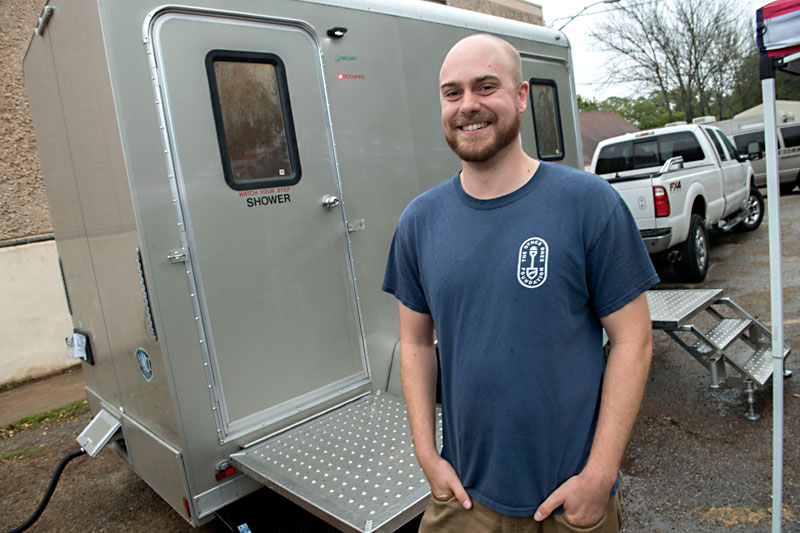
But a call for support from Ashley to donate to the cause quickly turned into a fundraising drive that Ronald expects will allow Chinatown to provide 800 hot meals, to be delivered to Keep Austin Fed, which works with restaurants to provide excess food to other groups helping to address food insecurity. He expects to make about 100 meals a week until the 800 are donated, and he now has a system in place at Chinatown's three locations where customers pay an extra $5 to donate a meal. He says that amount will net him about $1 in profit on each meal, which he is using to bring back two restaurant staffers.
But Cheng is under no illusion that he can solve this problem on his own. He is calling on other restaurants to do what they can to institute similar meal donation programs. "We're going to go as long as we can, but we need others to help," he told us Tuesday. "We all need to step up, because a little bit of something is better than nothing."
Keep Austin Fed volunteers are still out delivering food, though with operational changes that respond to those of both their donors and partners. Restaurants have less food to give away, and providers like Caritas of Austin are no longer operating soup kitchens (opting instead for sack lunches). "A lot of our future is dependent on how food contributors are changing," KAF Executive Director Lisa Barden told us. "Restaurants have begun stepping up, and our volunteers are ready to continue helping." KAF is also considered an essential service that's exempt from stay-home restrictions. She is hopeful that if more restaurants do what Cheng has done at Chinatown, she'll have plenty of work to keep her volunteers busy.
The Kids Are Alright, Too
Even some young Austinites are stepping up to help feed our unhoused neighbors. About 14 members of EMS Explorer Post 247 – a group of young people aged 14-21 who are introduced to careers in emergency medical services through classes and training from sworn EMS personnel – have been raising money to buy food and supplies.
America Gonzalez, lieutenant commander of programs with the Explorers, told us that after their weekly meetings were canceled due to prohibitions on gatherings of 10 or more people (there are currently 40 people in the program), she and her colleagues wanted to find a way to keep helping their community. Initially, they offered to do grocery runs or tend to pets for EMS workers who are increasingly overburdened. But the agency's CHPs said there was an even greater need: helping to feed people without homes.
Gonzalez, a high school senior, got to work developing a system by which the explorers could collect money (a Venmo account, @Explorer_Post_247, managed by the program's advisor, Amanda Baker) and send members on supply runs. Gonzalez and another program officer, Lt. Commander of Admin Nolan Screen, are basically running the effort. Baker distributes the money, but Screen and Gonzalez keep track of which Explorer is buying what and for whom. "Seeing the [CHPs] help people experiencing homelessness has made us realize how fortunate we are," Gonzalez said of the work. "It's a moment where we've realized we need to use the privilege we have to keep helping out our community."
Screen, a freshman at St. Edward's University, told us he and his fellow Explorers are determined to keep their project going despite the stay-at-home restrictions. Now, they are instructing runners to only purchase items on the lists provided by CHPs if they are already shopping for themselves or their families. Baker will pick up the supplies on her way to or from work – yet more time without pay that a first responder will spend helping.
As of March 24, the Explorers had collected $400 and delivered two pickup trucks' worth of supplies to Baker. "I've run the program for five years now," Baker told us. "It didn't surprise me that they wanted to help. They're always doing things like this, but it caught me off guard that they were wanting to help amid everything shutting down. But that's really just who they are."
What Can the City Do?
Amid all of the community support, what role should the city and county play in helping to feed people experiencing homelessness? Before the coronavirus, those entities did not play much of a role in securing food access – that work fell on the churches, service providers, and food pantries. But we're in an entirely new world now, and those entities are struggling to even keep their doors open, let alone operate at their pre-COVID-19 capacity.
In a memo released March 27, Assistant City Managers Chris Shorter and Rodney Gonzales outlined how homeless services are responding to COVID-19, including providing access to food. "The Homelessness Taskforce" is "partnering with community agencies while developing pilots to secure food from organizations that provide emergency meal distribution as well as fresh food to communities in need," the memo reads. That includes a contract with Revolution Foods, the meal provider contracted to feed students throughout the U.S., including in Austin, amid school closures. The contract will allow for distribution of food to "multiple locations within 48 [hours] of being requested."
In all, staff expects its several pilot programs – which include partnering with local restaurants and an "emergency food system exchange" website where people can post needs and offer up other goods and services – to provide 200 meals, at several sites, per day to people experiencing homelessness. The broader program could provide 5,000 meals per week to families facing food insecurity. Since big feeding centers throughout the city would be difficult to operate while maintaining social distancing, the memo says a "micro-food-distribution model" is being developed to prevent the need for large crowds.
Service providers told us that, while fresh food every 48 hours or so sounds like a good idea, a better approach would be to provide about a week's worth of nonperishable food at a time, delivered to where people already are (like what TOOF is doing). This approach minimizes the number of personal contacts, allows those living in encampments to remain isolated; reduces the burden on already stretched outreach teams; and lowers the risk of exposure to the virus.
Another approach the city could take to help spread the distribution burden is to work with churches and others who have been forced to shut their doors but want to resume their service. Local health officials could help create a blueprint they could share for an environment where the needs of people experiencing homelessness could be met in a way that protects them and the volunteers serving them.
Community leaders immersed in this work, like Central Presbytarian's associate pastor Carolina Treviño, have barely had time to look up from getting unhoused neighbors the food and care they need, let alone to think about what the future will look like. After a long day on Tuesday working with volunteers to feed people at Camp Abbott, Treviño told us, "The work we're engaging in now is a marathon, it's not a sprint. ... We need to stay focused on the people we are here to help. These are the people that are the most vulnerable, and they don't have very far to fall."
Got something to say on the subject? Send a letter to the editor.





